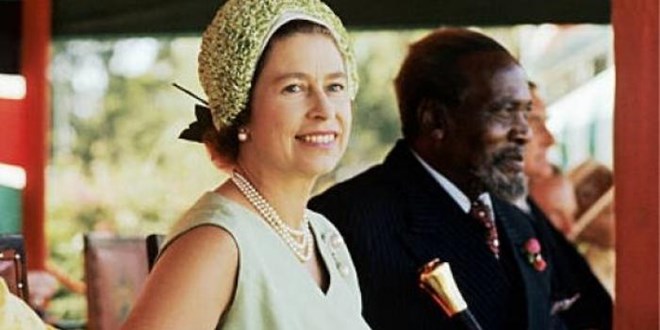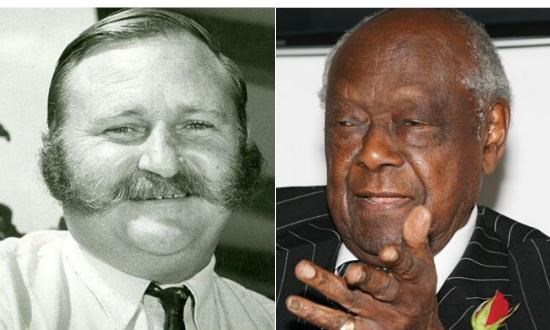
Tuesday November 12, 2019
Her Majesty Queen Elizabeth with Kenya's founding father Jomo Kenyatta in Nairobi, in March 1972. THE STANDARD
Kenya's maritime border dispute with Somalia has become President Uhuru Kenyatta's international relations headache. His father, Mzee Jomo Kenyatta, however, found a rather sleek but cheeky way of handling them.
An article by the Daily Nation on December 24, 2016, reported that documents released by the office of the British prime minister in London revealed that in 1967, Kenya made a secret pact with the British government to protect Kenya in case of an invasion by Somalia.
Mzee Kenyatta sent trusted Cabinet members in his government, Bruce McKenzie (Agriculture) and Charles Njonjo (Attorney General) to negotiate a military deal with Britain on his behalf, in an attempt to safeguard Kenya.
The pact reached was later referred to as the "Bamburi Understanding."

Bruce McKenzie and Charles Njonjo were key members of Mzee Jomo Kenyatta's Cabinet. They negotiated security pacts with the British government on behalf of President Kenyatta.
After Kenya attained independence in 1964, a prolonged shifta crisis led Kenya into requesting for a squadron of Hawker Hunter aircraft and BAC Strikemasters to help the military tackle the crisis.
However, Kenya's request was denied by the then Secretary of State for the Commonwealth Relations, Duncan Sandys, on grounds that the country could not afford them.
In an agreement dubbed the 'Sandys Understanding', Britain made a verbal commitment to come to Kenya's aid in the wake of any attack from Somalia.
Kenya was a new member of the Commonwealth at the time and the verbal agreement was regarded as a vague commitment by British policymakers.
Records dated May 24, 1966, indicated that when McKenzie and Njonjo asked the then British Secretary of Defence, Denis Healy about the Sandys Understanding, he revealed to them that Her Majesty’s government was “sympathetic (but) an unwritten obligation was not a meaningful concept in international relations”.
This sent panic through Mzee Kenyatta's inner circle.
Later that year on November 11, 1966, Kenyatta sent the duo to meet the then newly elected British Prime Minister, Harold Wilson.
After listening to Kenya and further consultation, Wilson formalised the agreement in a letter that was delivered to Kenya.
Njonjo told Wilson that he was “not seeking a formal undertaking, but an informal assurance that if Kenya asked for British help when under attack by Somalia, the help would be forthcoming”.
In the process, McKenzie revealed that apart from Kenyatta, Njonjo, Defence Minister Njoroge Mungai and himself, the rest of Kenyatta's cabinet believed there was a pact.
On January 13, 1967, two months after Harold Wilson's meeting with McKenzie and Njonjo, another secret meeting was held with George Thomas, the British secretary of state in the Commonwealth office. The main agenda was to figure out how to document the Sandys Understanding.
January 25, 1967, British High Commissioner to Kenya, Edward Peck, delivered the written assurance, today known as the 'Bamburi Understanding', to Kenyatta himself at his Bamburi home.
“If Kenya were the victim of outright aggression by Somalia, the British government would give the situation the most urgent consideration. While the British government cannot in advance give the Kenya government any assurance of automatic assistance, the possibility of Britain giving the Kenyans assistance in the event of an organised and unprovoked armed attack by Somalia is not precluded,” the message read.
In June 1967, a mediation spearheaded by Zambian President Kenneth Kaunda led to the signing of a memorandum between Kenya and Somalia in a bid to end border disputes.
In 1969, General Siad Barre led a militia into overthrowing the Somali Government. This made Kenya develop a fear that Barre would revive Somalia's ambition for the disputed territory.
Adding to the tension, in 1970, the Labour Party administration that made a commitment to Kenya through the Bamburi Understanding was replaced by the Conservative Party government led by Prime Minister Edward Heath.
Kenyatta sent his trusted duo with a private letter to the prime minister, seeking reassurance that he would preserve the security agreement.
“I have asked them (Njonjo and Mckenzie) to discuss with you what we now here call the Bamburi Understanding. I hope that you will kindly discuss this matter with my ministers who have my authority to do so. I am keen that the understanding should be continued with your government,” read the letter dated August 30, 1970, and signed by President Kenyatta.
Mckenzie, who was on sick leave in Britain, booked the appointment with the Foreign and Commonwealth Office (FCO) to deliver the letter to Number 10 Downing Street, the prime minister’s residence in London.
McKenzie informed the British high commissioner that Kenyatta wished for the Conservative government to renegotiate the Bamburi Understanding.
He reminded the British administration that Kenya had received RAF facilities and that the UK army was training in Nanyuki. However, Britain wanted to keep it 'vague and non-committal' and did not want to link these facilities to the understanding.
Harold Wison's Labour Party took power again in 1974 but he resigned in 1976 over accusation of espionage.
After Wilson's resignation, Kenyatta was willing to renegotiate the understanding and sent Njonjo to meet newly elected, PM James Callaghan in London on May 14.
Callaghan was hardly two months in office and on his desk was a Foreign and Commonwealth Office background note with a header - 'Bamburi Understanding'.
The note is shelved at the British Archives in Kew Gardens and is a vital document that shows what Britain thought of Kenya’s crisis with Somalia.
The pact set course for the relationship between Kenya and the Republic of Somalia creating a wave of peace Kenya has ridden on to date.
Kenyatta's son, Uhuru, Kenya's president, faces a maritime border dispute with Somalia. Somalia refused to reach an understanding with Kenya leaving the matter to the resolve of the international court of Justice.
The dispute is set to be heard in June 2020.